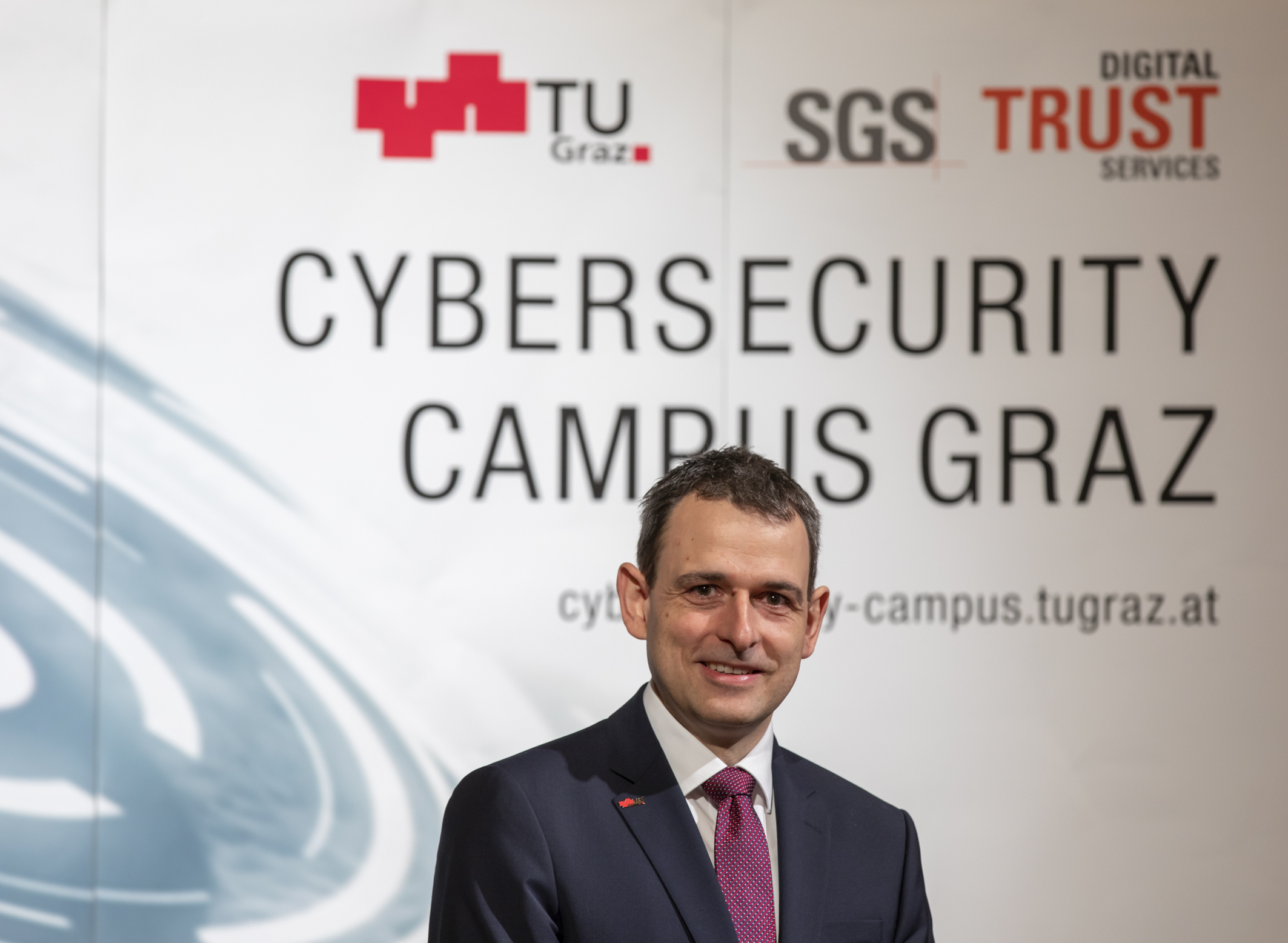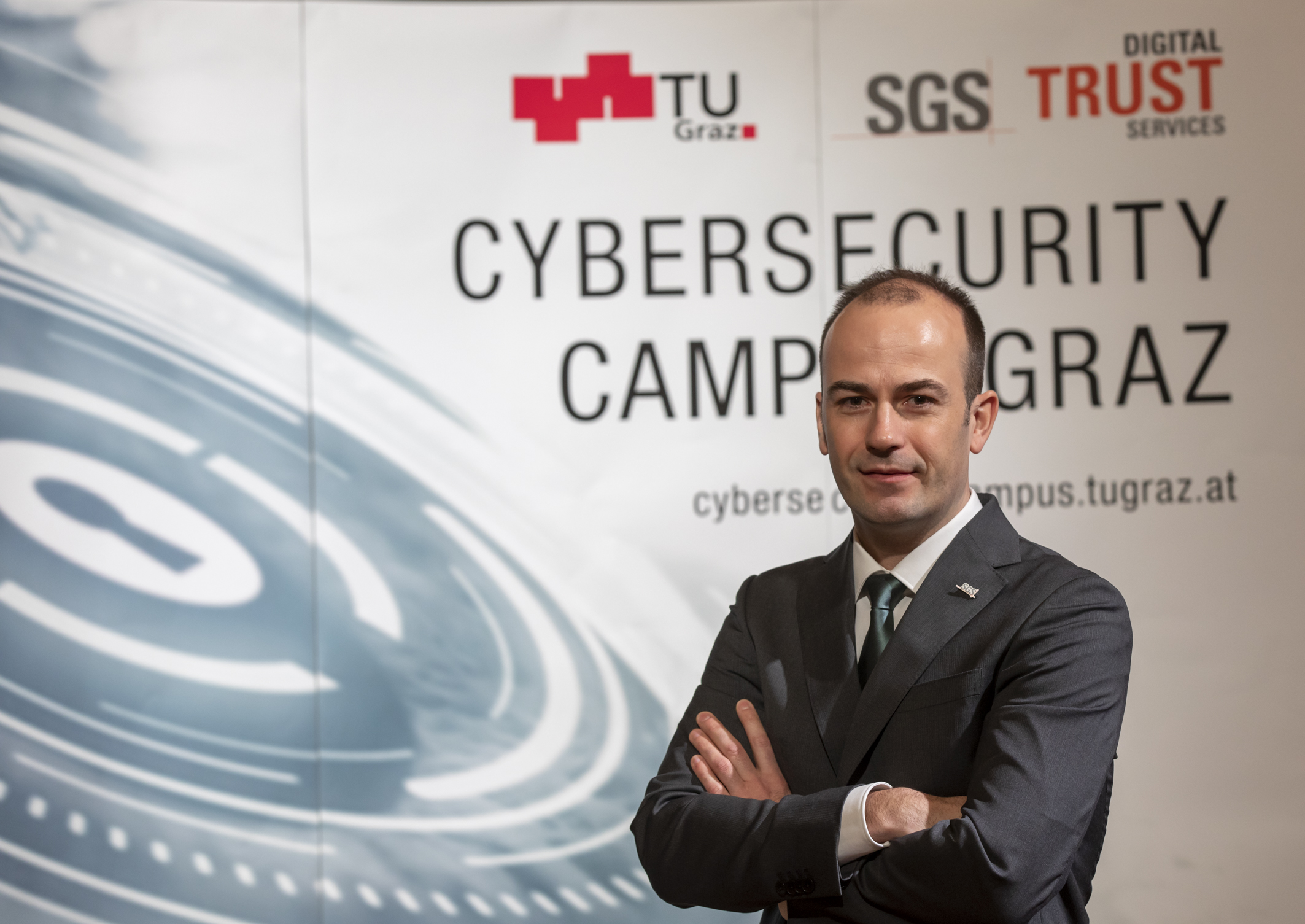Multi-million euro investment in IT security: SGS and TU Graz set up Cybersecurity Campus Graz
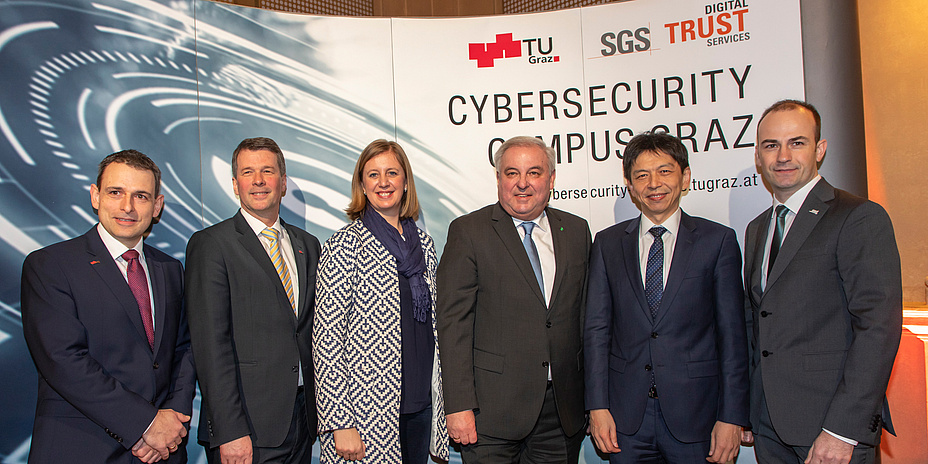
Additional pictures for download at the end of the text
A unique IT security research, education, testing and certification hub is taking shape in Styria, Austria: Cybersecurity Campus Graz. The centrepiece is a new joint research centre and a cybersecurity testing and certification laboratory operated by the SGS Group. Around 400 people will work and perform research there when it enters full operation.
Highly integrated production plants, smart homes and autonomous vehicles: the Internet of Things, where billions of computers and systems communicate wirelessly, is becoming an increasingly significant element of private and professional life. Linking the real world with the cloud delivers greater convenience and increased productivity – but also completely new threats. Cybersecurity has implications for all products and systems – from everyday objects to data centres – and represents a major challenge for our society.
International IT security hub
SGS, the world leader in inspection, testing, verification and certification, and TU Graz, a top IT security research institution, have joined forces to set up Cybersecurity Campus Graz. They respond to the challenge outlined above by means of work in three core areas:
1. Research on analysing system security and on fundamental new security concepts.
2. Education for IT security experts and researchers who are in such strong demand.
3. Testing and certification of product and system security.
All of these activities – from basic research and higher education programmes to certification – will take place at the Cybersecurity Campus, with a view to developing sustainable security solutions. This will give rise to a unique environment for research and the development of industrial applications. A new joint research center and a cybersecurity testing and certification laboratory operated by the SGS Group will be the first facilities to be set up at Cybersecurity Campus Graz. The Campus will also open its doors to start-ups as well as industrial and scientific partners, who will work with TU Graz and SGS to research and develop security solutions for the future. A new multifunctional building covering around 7000m2 – the heart of Cybersecurity Campus Graz – will be built at TU Graz’s Inffeldgasse Campus.
New research centre as a hub for knowledge transfer
Operations at the joint SGS-TU Graz research centre at Cybersecurity Campus Graz will be launched during this year. TU Graz’s expertise in leading-edge research into cybersecurity – in the shape of one of the world’s top research groups at the Institute of Applied Information Processing and Communications – dovetails with SGS’ capabilities in security testing and the evaluation of products, systems and services. The planned close collaboration with start-ups and established businesses will enable the research centre to act as a vital link between science and industry.
In the view of SGS’ CEO Frankie Ng, the interconnection between research, teaching and practice is the logical next step in his group’s pioneering global operations: “With this investment, SGS confirms its commitment to provide existing and new customers with the most advanced cybersecurity services. The partnership with TU Graz establishes a unique and practical environment to combine research, education and practice to sustainably address the threats of cybersecurity in an increasingly interconnected world.”
Results from the centre's basic research will be made available for all. This will enable sectors in which IT security is a key consideration to keep abreast of the state of the art, and allow the latest findings to feed into industrial applications, university teaching and training programmes aimed at the next generation of IT security specialists. Trainings and joint projects will also promote the transfer of knowledge from scientific research to industry.
Harald Kainz, Rector of TU Graz, underlines the potential of this joint initiative: “Two perfectly matched partners will bundle their research, application and training capabilities at Cybersecurity Campus Graz, working together to address one of the major challenges facing modern-day society. TU Graz’s excellent reputation in IT security research has paved the way for this unrivalled partnership with SGS – a global business – which further strengthens the high-tech location Graz as a world-class cybersecurity hub.”
High-tech lab for assessing product and system cybersecurity
In addition to SGS’ investment in the research centre, the group will also base its subsidiary SGS Digital Trust Services GmbH at Cybersecurity Campus Graz. As a result, the Styrian capital will be home to SGS’ global headquarters for its system and product security business. The site will feature a high-tech infrastructure in one of the world’s biggest cybersecurity evaluation labs, for use by security experts specialising in cybersecurity testing and certification for digital products, networked systems and online services. Close cooperation with top players in IT security research at Cybersecurity Campus Graz will ensure that the latest findings are quickly integrated into SGS’ high-end services. Students, researchers and partners will also be able to use the laboratory equipment for training purposes. The SGS team has already started working in Graz. Until completion of the main building at Cybersecurity Campus Graz, SGS’ team and the research centre will be based in a temporary facility on the TU Graz site which is due to be completed shortly.
Raising Styria’s profile as a business and research location
The outstanding research performance of TU Graz in the field of IT security and the good exchange between business, politics and science in Styria were decisive for Graz as location. The partnership between SGS and TU Graz will create new jobs, thereby enhancing Styria’s reputation as a business location, and burnish the province’s credentials as a leading research region.
“The groundbreaking collaboration between SGS and TU Graz is testimony to the tremendous work taking place in Styria. The interplay between business and science will open up new opportunities for talented Styrians, and bring out the best in them, as well as creating long-term jobs,” commented Provincial Governor Hermann Schützenhofer, who together with Barbara Eibinger-Miedl, Provincial Minister for business and research, thanked Frankie Ng and Harald Kainz for launching the initiative.
“Effective protection against cybercrime is hugely significant for businesses in the digital age. TU Graz has produced outstanding research in this field in recent years, which grabbed the headlines around the world. SGS’ investment underscores TU Graz’s outstanding achievements and highlights Styria’s position as a province specialised in innovation and research. In future, Cybersecurity Campus Graz will be in a position to develop products and systems that are crucial to worldwide internet security,” Eibinger-Miedl said.
About SGS
SGS is the world’s leading inspection, verification, testing and certification company. It is recognized as the global benchmark for quality and integrity. With more than 97,000 employees, SGS operates a network of more than 2,600 offices and laboratories around the world. The SGS Group is headquartered in Geneva, Switzerland.
About TU Graz
Cybersecurity has been a research focus at TU Graz for many years. Discovery of the Meltdown and Spectre security vulnerabilities and development of the KAISER patch a few months ago by a team at TU Graz are just the tip of the iceberg as far as the university’s expertise in IT security is concerned. This research area is part of TU Graz’s Field of Expertise “Information, Communication and Computing”, one of the university’s five strategic research focuses in emerging fields.
Kontakt
Cybersecurity Campus Graz
Stefan MANGARD, Professor for IT security
TU Graz | Institute of Applied Information Processing and Communications
Martin SCHAFFER, Global Head of Secure Products & Systems
SGS Digital Trust Services GmbH
Tel. +43 316 873 5514
Email: stefan.mangard@tugraz.at



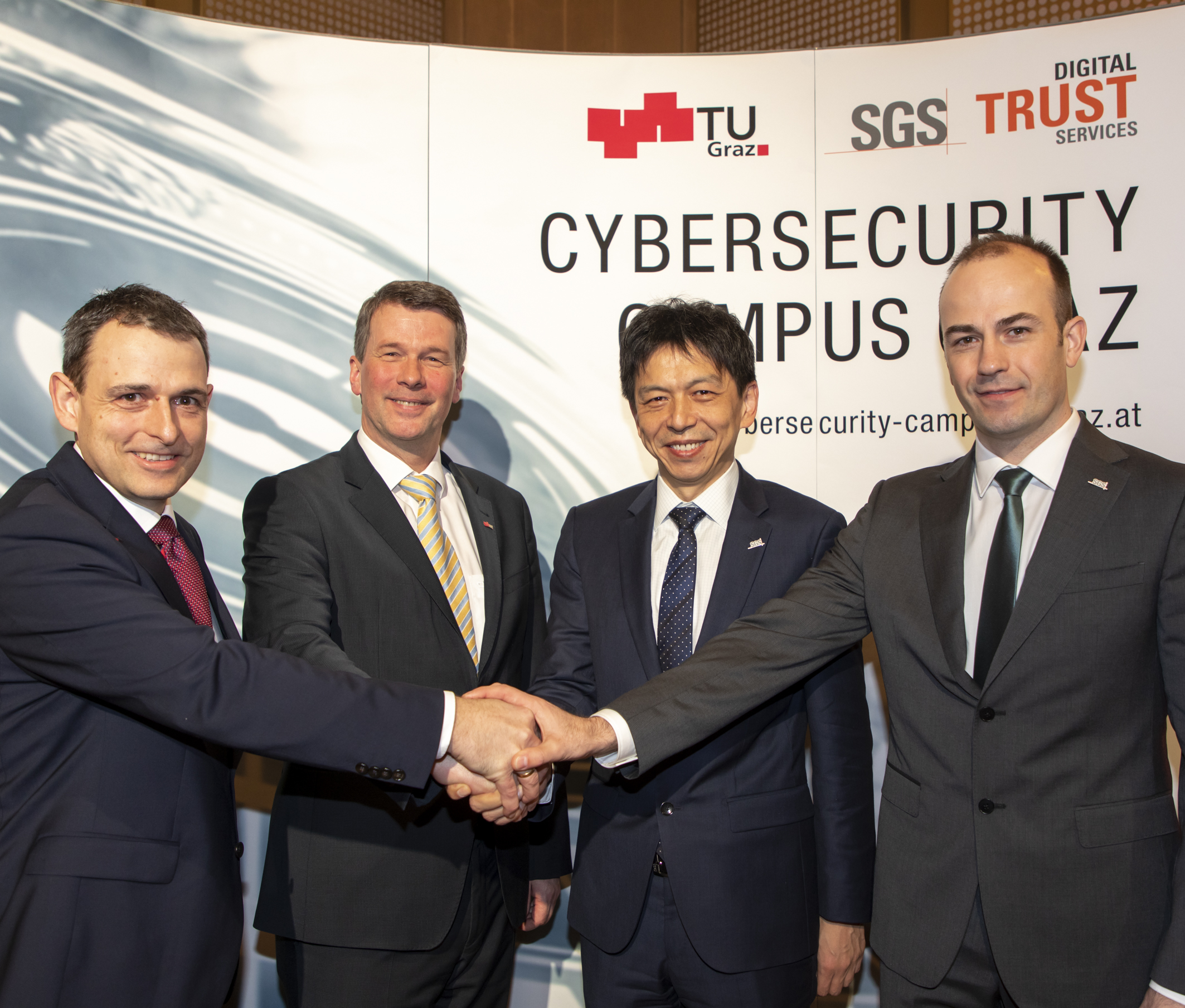
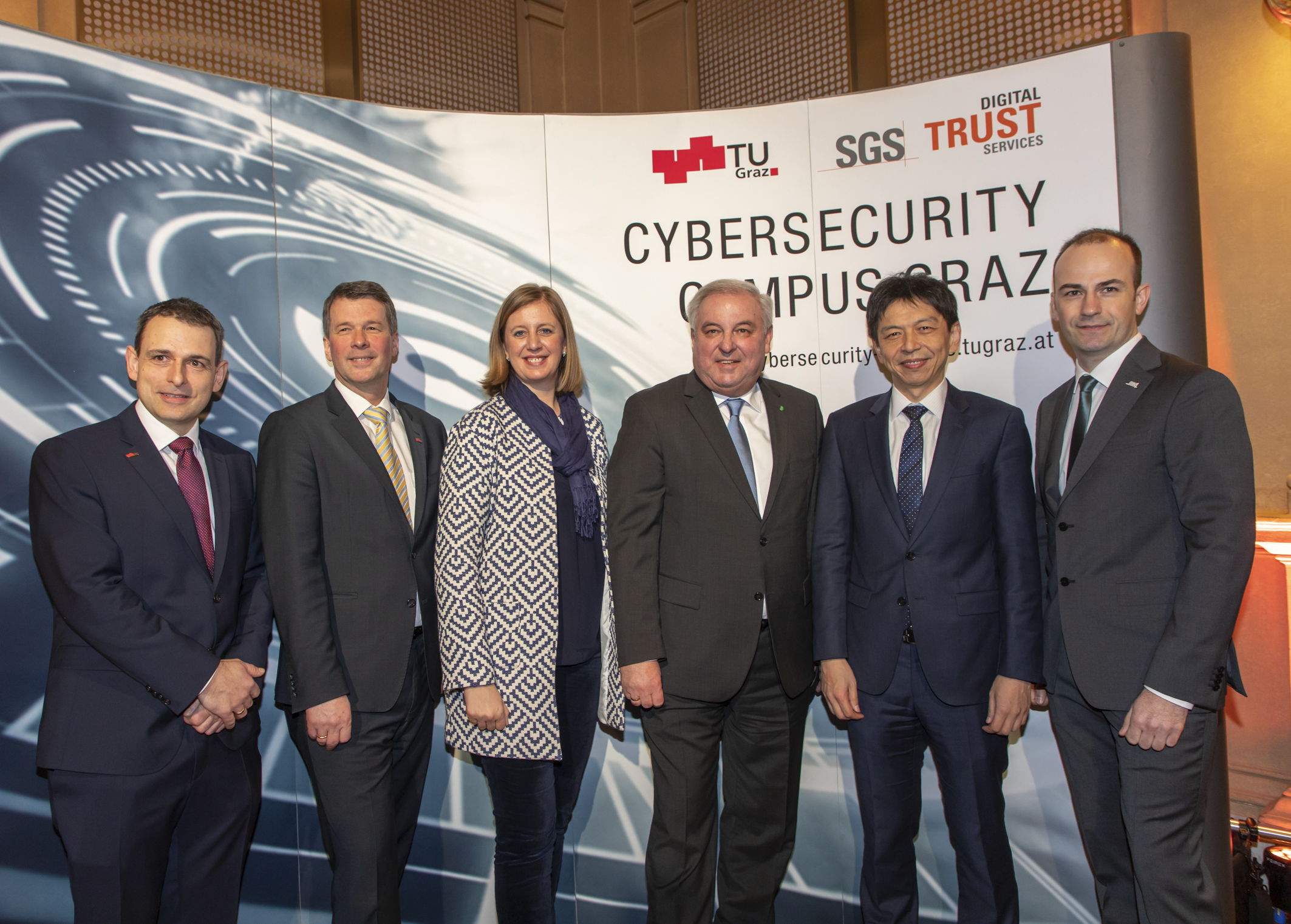
![[Translate to Englisch:] © Lunghammer – TU Graz [Translate to Englisch:]](https://www.tugraz.at/fileadmin/user_upload/tugrazInternal/News_Stories/Medienservice/2019/Cybersecurity_Campus_Graz/CSC-Graz_72_by_lunghammer_tugraz.jpg)
